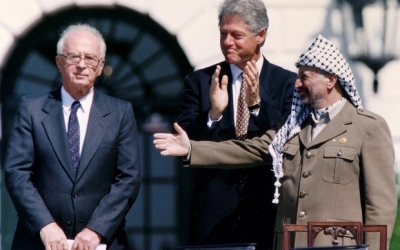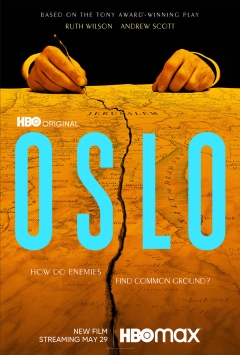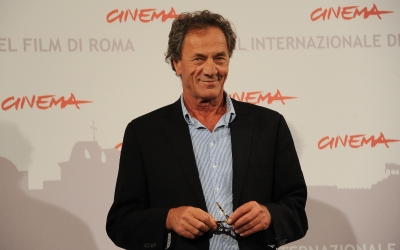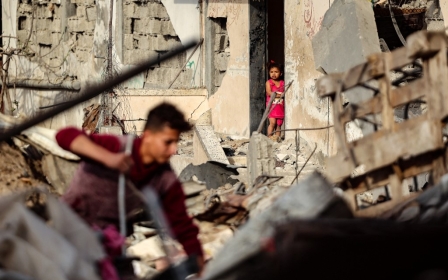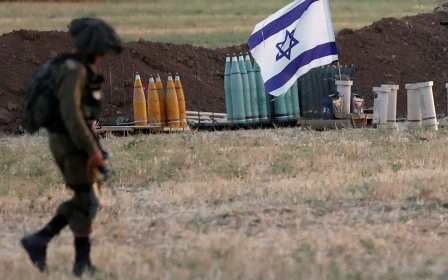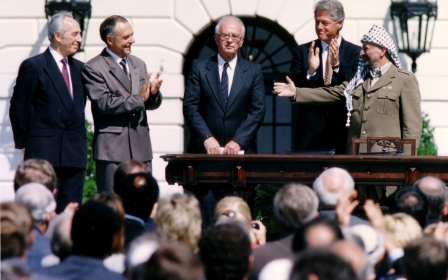Why the movie Oslo is a missed opportunity for Hollywood
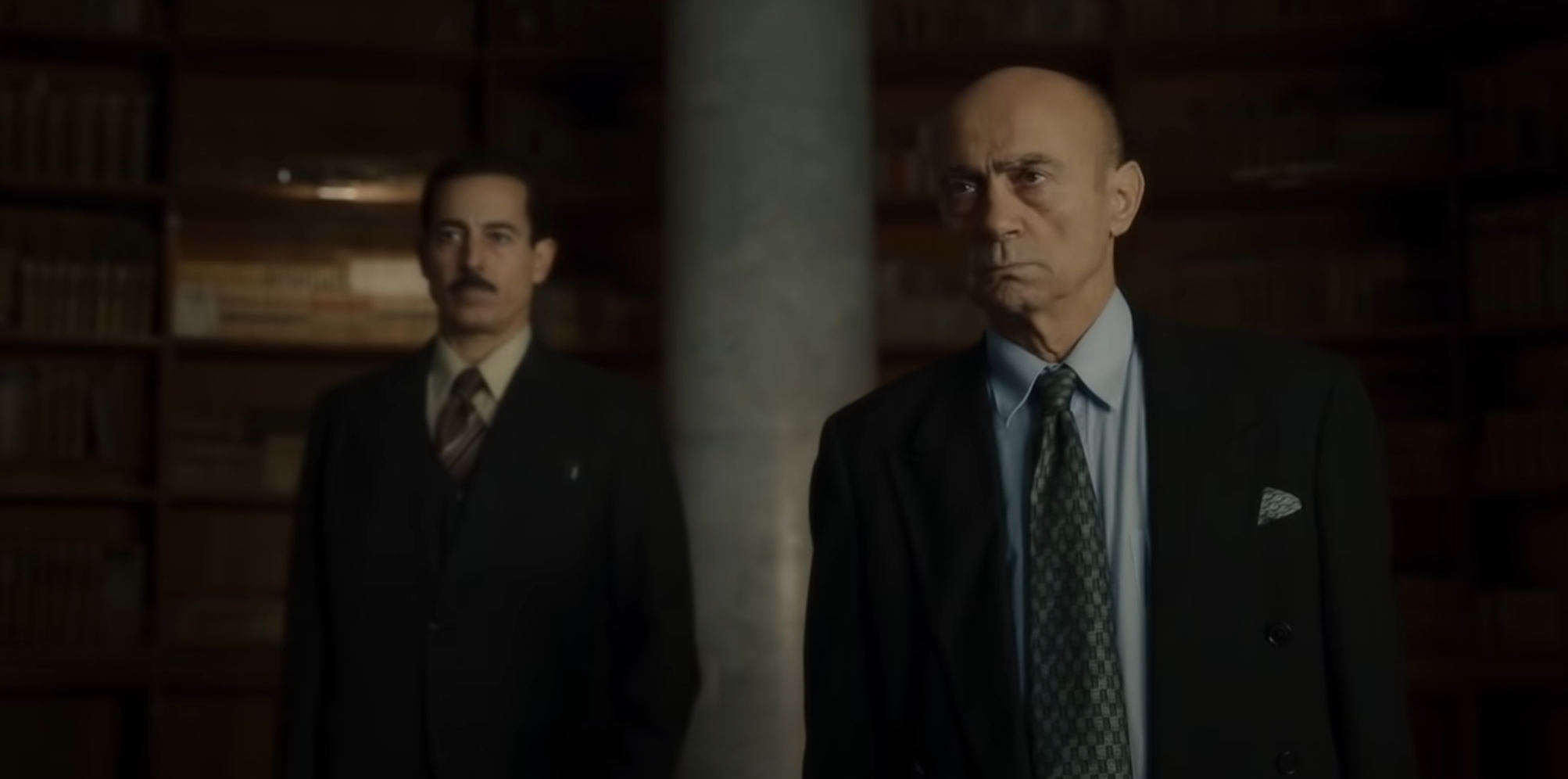
In one of the most telling scenes of Bartlett Sher’s new film Oslo, Uri Savir, former director-general of the Israeli foreign ministry, tells a member of the Palestine Liberation Organisation (PLO): “You killed our athletes in Munich; murdered our schoolchildren in Ma'alot; invaded us and spilled our blood in Yom Kippur.”
In response, Ahmed Qurei, director-general of the PLO's economic branch, says: “You burned our homes; drove a million people from Palestine; and claimed to this day that there was no such thing as Palestine.”
Throughout the film, Sher and playwright, JT Rogers, cast the Israeli-Palestine conflict within this binary framework, insisting that the damage each side of the conflict has inflicted on the other is equal in its gravity and impact. There is no one party that holds the upper hand in this conflict, or so it is shown, and thus the desire for “peace” is equally shared across the board.
This is the narrative Western media has propagated since 1948, persistently giving the impression that one of the longest conflicts in modern history has been evenly matched all along.
Recent Israeli violence against Palestinians has put to bed that myth, awakening much of the world to the injustices Palestinians have been subjected to for more than half-a-century. Oslo couldn’t have been more tone-deaf - a prime emblem of Hollywood’s oversimplified treatment of the Israel-Palestine conflict that no longer feels relevant or rings true.
Based on Rogers’ 2016 Tony-winning Broadway hit of the same name, Oslo is a dramatisation of the back-channel negotiations set up by Norwegian diplomat couple, Mona Juul (Ruth Wilson) and Terje Rod-Larsen (Andrew Scott), between the Israelis and Palestinians, which ended in the Oslo Accord of 1993.
Juul, the architect of the discussions, moved to bring the Israelis and Palestinians to the same table for the very first time after witnessing a Palestinian boy being shot by an Israeli soldier during the first intifada (the causes of which are never explored).
False equivalence
It wasn’t just the sight of the dead Palestinian teenager that haunted Juul, however, it’s also the look of fear he exchanged with a terrified young Israeli soldier who could not pull the trigger himself. A colleague does the job instead, killing the Palestinian who was armed with nothing but a rock.
“They both shared the same fear,” Juul would later reflect, as if there were any parity between someone armed with a rock and another with an assault rifle.
From its very first frames, Rogers and Sher establish the neutral tone of the picture, equating the victim with the aggressor, and making a feeble argument that both parties wanted peace for the same guileless, lofty reasons.
Both parties initially approach one another with suspicion, the Palestinians more so than the Israelis. The Israelis, represented by University of Haifa professors Yair Hirschfeld (Dov Glickman) and Ron Pundak (Rotem Keinan), and later by the aforementioned Savir (Jeff Wilbusch) and Legal Adviser of the Ministry of Foreign Affairs Joel Singer (Igal Naor) are shown to be reeling from the violence of the intifada and its impact on global public opinion of the Jewish state, but are generally quite composed.
The Palestinians, represented by Qurei (Salim Dau) and fellow negotiator Hassan Asfour (Waleed Zuaiter) appear to be more hot-tempered and irrational at times, with the latter especially throwing tantrums at the “colonialist” enemy, as he brands them when the opportunity comes up.
As in most streamlined Hollywood productions, the two parties learn to sidestep their differences and identify each other’s humanity. Distrust and suspicion gradually give way to respect and levelheadedness, and national interests take a backseat, giving way to the ensemble’s burning desire for peace.
Thus, what on paper promises to be an insightful look at the intricate political manoeuvres that led to the botched agreement swiftly descends into a bafflingly amiable meet-cute comic-drama devoid of any complexity or depth.
Problematic portrayals
Hollywood is no stranger to Israeli-Palestinian history. The conflict received its first full-screen treatment in Otto Preminger’s infamous Exodus (1960), starring Paul Newman and Eva Marie Saint. Based on Leon Uris’s 1958 novel of the same name, the film and the book chronicle the foundation of Israel from the point of view of illegal Jewish immigrants fleeing from the European Holocaust to the promised land.
The film shrewdly avoids rendering Arabs as the antagonising villains (although they kidnap, torture and murder Jews), but rather as faceless, marginal characters, who welcome Jewish settlers with open arms to bring civility to the land and as potential allies against the brutish British colonisers. As several scholars have noted, Exodus depicts Palestine as a country without people - a forgotten land itching to be populated by the heroic Jewish liberation fighters.
With the formation of the PLO in 1964, Palestinians were morphed from faceless, indigenous inhabitants of the flourishing state of Israel into Arab terrorists and hostile neighbours - a role Hollywood would ascribe to them until the beginning of the new century.
Examples are abound: Melville Shavelson’s Cast a Giant Shadow (1966); Preminger again in 1975 with Rosebud; Richard C Sarafian’s The Next Man (1976); Irvin Kershner’s Raid on Entebbe (1976); John O'Connor’s Warhead (1977); John Frankenheimer’s Black Sunday (1977); Terry Leonard’s Death Before Dishonor (1987), to name a few.
All of these films follow nearly the same template: Palestinians are provocateurs and bloodthirsty savages hellbent on disrupting the fragile stability of the Middle East and then, in later movies, the entire world.
Action movies and thrillers from the 70s emphasise US involvement in the region, casting the superpower in the role of balanced arbitrator and protector of Israel from the dangers posed by Arabs.
There were few exceptions. Amos Kollek’s Double Edge (1992), starring Faye Dunaway, follows an American reporter uncovering a wave of corruption and abuses against Palestinians in Jerusalem. Most famous was Hanna K. (1983), Costa-Gavras’ clear-eyed indictment of Israel’s racist military court system which was heavily attacked by Zionist groups at the time.
As more Palestinian filmmakers began to reveal their view of the conflict, the Israeli-Palestinian issue no longer seemed a viable dramatic conceit to be exploited by Hollywood any longer. The most notable Hollywood production to tackle the conflict this century was Steven Spielberg’s much-discussed Munich (2005), the spy thriller tracing the efforts of Mossad in tracking down the Palestinian terrorists who murdered a group of Israeli athletes during the 1972 summer Olympics.
Maturely refraining from demonising Palestinians while debunking the myth of the fearless Israeli superman soldier, Spielberg nonetheless does not attempt to offer a comprehensive explanation of the attackers’ motivations in relation to the systematic discriminatory measures implemented by the Israeli occupier. Spielberg does give the Palestinians a human face, but he doesn’t expound on the poverty, displacement and persecution that propelled them to resort to violence.
‘Nothing but fiction’
In comparison to these earlier films, Oslo represents a major upgrade in the representation of Palestinians in Hollywood: a prestige production that partially acknowledges Israel’s responsibility in the conflict. Oslo would have been heralded as a major breakthrough in the Hollywood treatment of the conflict 20 years ago. Now, however, its neutrality looks out of step with the time - an ostensibly inoffensive ploy that ends up hurting the Palestinian cause instead of doing it justice.
To avoid raising difficult questions about the power dynamics that informed the treaty and the major lapses that allowed the Israelis to strengthen their grip in subsequent decades, Oslo flattens the accord, condensing it into a series of even concessions accepted by each party to put an end to violence and finally achieve a dignified co-existence. That, of course, was nothing but fiction.
There is no denying that Oslo did serve the PLO well at the time, allowing Yasser Arafat - whose credibility took a hit in the wake of his support of Saddam Hussein during the Gulf War as the film hints - to return to Palestine and grant the occupied West Bank and Gaza Strip the right of self-rule for the first time. The PLO never ruled inside Palestine prior, thus Oslo was certainly a major coup for the organisation - an imperative step for an adequate two-state solution.
The film does acknowledge that some key issues, most prominently the status of Jerusalem, were set aside for future negotiations. As in most of these contested issues, which also include Israel’s control of the border security, Rogers naively takes Israel’s ostensible earnestness to negotiate them at face value.
In doing so, he deems them as integral pieces of difficult but essential concessions necessary for the grander achievement of peace, rather than a deliberate ploy by the Israelis to maintain control over the land. Rogers gives the benefit of the doubt to the Israelis, treating the original agreement in isolation from subsequent Israeli violations and attempts to use the treaty to their benefit.
To that end, a number of Israeli violations and abuses of power are ignored, such as the expansion of settlements; the allocation to Israel to control of more than 80 percent of the water in West Bank aquifers compared with 17 percent for the Palestinians and the economic independence of Palestine in relation to Israel’s control over the land and water.
Additionally, Qurei’s incessant claim in the film that Israel will never be accepted by its 350 million Arab neighbours seems far-fetched and implausible even in the 1990s. The quote comes on the heels of the 1978 Camp David peace treaty between Egypt and Israel and the 1982 Lebanese massacre of Sabra and Shatila, the Arab response to which appears to show that neighbouring states have abandoned the Palestinian cause once and for all.
Some skeptics such as Edward Said, who dubbed the agreement “a foolish gamble that has already done far more harm than good” saw the fatal flaws in the accord’s design from the start - flaws that are brushed over by Rogers.
The space given to Israel to cement its self-promoted myth may have shrunk through the years but any work that questions its basic foundations remains taboo
While more and more Palestinian talents make their mark in Hollywood - actors Hiam Abbass (Ramy, The Visitor), Ali Suliman (The Looming Tower, Body of Lies) and Waleed Zuaiter (Sex and the City 2, The Men Who Stare at Goats); directors Cherien Dabis (Amreeka, Empire) and two-time Oscar nominee Hany Abu Assad (Paradise Now, The Mountains Between Us) - the industry remains reluctant to give a platform to the Palestinian narrative. The space given to Israel to cement its self-promoted myth may have shrunk through the years but any work that questions its basic foundations remains taboo. The Nakba and ’67 remain off-limits topics that Hollywood still doesn’t want to touch.
Oslo, ironically, is as much as Hollywood allows the Palestinian voice to be heard within its orbit - a work too calculated, too safe and too toothless to land a substantial punch. Make no mistake, the PLO was not entirely blameless, committing to an agreement that weakened its position and concurrently amplified Palestinian pain.
Sher and Rogers nevertheless get one vital detail right: the Israelis were adamant from the start to mire the PLO in governance, forcing the organisation to abandon its existential liberation objectives and throwing it into a spiralling web of internal power play and corruption.
Bloodshed was spilled on both sides, and both Munich and Ma'alot (in which the Marxist–Leninist group Democratic Front for the Liberation of Palestine killed 25 schoolchildren and teachers in 1974) are witnesses to the ugly turns the Palestinians have occasionally taken as they scrambled to put an end to the occupation.
Given Israel’s tightening of security and its growth as a nuclear superpower, the possibility of another Munich or Ma'alot is extremely unlikely. The Israeli-Palestine conflict has not been an even contest for decades; in fact, to be more accurate, the conflict has never been an even contest to begin with.
Transformative, worthwhile art is one that is radical, confrontational and defiant. Oslo is laced with good intentions - an ingenuous belief in the possibility of peace and the virtue of peace. But what kind of peace is one that is dictated and formulated by the occupier?
Oslo is neither radical nor confrontational; a middle-of-the-road fable that initially emerges as a corrective effort to underline a cause that has been distorted by Hollywood for decades, but ultimately imparts the kind of reductive discourse complicit in undermining the suffering of Palestinians.
Middle East Eye delivers independent and unrivalled coverage and analysis of the Middle East, North Africa and beyond. To learn more about republishing this content and the associated fees, please fill out this form. More about MEE can be found here.


